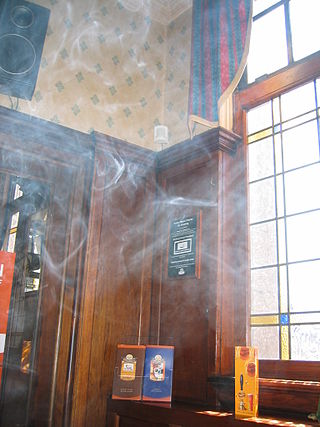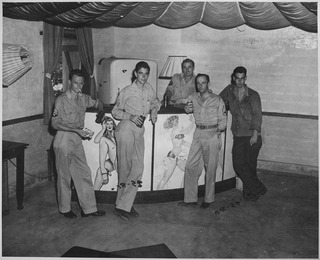
A cigarette is a narrow cylinder containing a combustible material, typically tobacco, that is rolled into thin paper for smoking. The cigarette is ignited at one end, causing it to smolder; the resulting smoke is orally inhaled via the opposite end. Cigarette smoking is the most common method of tobacco consumption. The term cigarette, as commonly used, refers to a tobacco cigarette, but the word is sometimes used to refer to other substances, such as a cannabis cigarette or an herbal cigarette. A cigarette is distinguished from a cigar by its usually smaller size, use of processed leaf, and paper wrapping, which is typically white.

Smoking bans, or smoke-free laws, are public policies, including criminal laws and occupational safety and health regulations, that prohibit tobacco smoking in certain spaces. The spaces most commonly affected by smoking bans are indoor workplaces and buildings open to the public such as restaurants, bars, office buildings, schools, retail stores, hospitals, libraries, transport facilities, and government buildings, in addition to public transport vehicles such as aircraft, buses, watercraft, and trains. However, laws may also prohibit smoking in outdoor areas such as parks, beaches, pedestrian plazas, college and hospital campuses, and within a certain distance from the entrance to a building, and in some cases, private vehicles and multi-unit residences.

Passive smoking is the inhalation of tobacco smoke, called secondhand smoke (SHS), or environmental tobacco smoke (ETS), by persons other than the intended "active" smoker. It occurs when tobacco smoke enters an environment, causing its inhalation by people within that environment. Exposure to secondhand tobacco smoke causes disease, disability, and death. The health risks of secondhand smoke are a matter of scientific consensus. These risks have been a major motivation for smoke-free laws in workplaces and indoor public places, including restaurants, bars and night clubs, as well as some open public spaces.
Steven J. Milloy is a lawyer, lobbyist, author and Fox News commentator. His close financial and organizational ties to tobacco and oil companies have been the subject of criticism, as Milloy has consistently disputed the scientific consensus on climate change and the health risks of second-hand smoke.
Action on Smoking and Health (ASH) is the name of a number of autonomous pressure groups (charities) in the anglosphere that seek to publicize the risks associated with tobacco smoking and campaign for greater restrictions on use and on cigarette and tobacco sales.

Tobacco use has predominantly negative effects on human health and concern about health effects of tobacco has a long history. Research has focused primarily on cigarette smoking.
The Advancement of Sound Science Center (TASSC), formerly The Advancement of Sound Science Coalition, was an industry-funded lobby group and crisis management vehicle, and was created in 1993 by Phillip Morris and APCO in response to a 1992 United States Environmental Protection Agency (EPA) report which identified secondhand smoke as a "confirmed" human carcinogen. TASSC's stated objectives were to: (1) discredit the EPA report; (2) fight anti-smoking legislation; and (3) pro-actively pass legislation favourable to the tobacco industry.

A menthol cigarette is a cigarette flavored with the compound menthol.
Stanton Arnold Glantz is an American professor, author, and tobacco control activist. Glantz is a faculty member at the University of California, San Francisco (UCSF) School of Medicine, where he is a Professor of Medicine (retired) in the Division of Cardiology, the American Legacy Foundation Distinguished Professor of Tobacco Control, and former director of the Center for Tobacco Control Research and Education. Glantz's research focused on the health effects of tobacco smoking.
Respiratory Health Association is a nonprofit organization located on Chicago's Near West Side.
The Tobacco Institute, Inc. was a United States tobacco industry trade group, founded in 1958 by the American tobacco industry. It was dissolved in 1998 as part of the Tobacco Master Settlement Agreement.

Tobacco control is a field of international public health science, policy and practice dedicated to addressing tobacco use and thereby reducing the morbidity and mortality it causes. Since most cigarettes and cigars and hookahs contain/use tobacco, tobacco control also concerns these. E-cigarettes do not contain tobacco itself, but (often) do contain nicotine. Tobacco control is a priority area for the World Health Organization (WHO), through the Framework Convention on Tobacco Control. References to a tobacco control movement may have either positive or negative connotations, depending upon the commentator.
Smoking in China is prevalent, as the People's Republic of China is the world's largest consumer and producer of tobacco: there are 350 million Chinese smokers, and China produces 42% of the world's cigarettes. The China National Tobacco Corporation is by sales the largest single manufacturer of tobacco products in the world and boasts a monopoly in Mainland China generating between 7 and 10% of government revenue. Within the Chinese guanxi system, tobacco is still a ubiquitous gift acceptable on any occasion, particularly outside urban areas. Tobacco control legislation does exist, but public enforcement is rare to non-existent outside the most highly internationalized cities, such as Shanghai and Beijing. Furthermore, outside the largest cities in China, smoking is considered socially acceptable anywhere at any time, even if it is technically illegal.

Smoking in the United States military has been observed in previous wars, but smoking's close association with the United States military started in World War I when tobacco companies began to target military personnel through the distribution of cigarettes to servicemen and the eventual inclusion of cigarettes into rations. Although the military has attempted to implement tobacco control initiatives, the association between smoking and military personnel has persisted to the present day as smoking rates remain high, despite declines in civilian rates. Such high rates have led to questions about the effect of smoking from the apparent health risks to troop readiness and training costs.

There are smoking cessation policy initiatives by the United States government at federal, state and local levels.
Tobacco is an agricultural product acting as a stimulant triggering complex biochemical and neurotransmitter disruptions. Its main ingredient is nicotine and it is present in all cigarettes. Early tobacco usage was for medical cures and religious purposes. In the early 1900s, cigarette usage became increasingly popular when it was sold in mass amounts. In 1964, the Surgeon General of the United States wrote a report concerning the dangers of cigarette smoking. In the United States, for the past 50 years efforts have been made so that the public should be aware of the risks of tobacco usage.
The scientific community in United States and Europe are primarily concerned with the possible effect of electronic cigarette use on public health. There is concern among public health experts that e-cigarettes could renormalize smoking, weaken measures to control tobacco, and serve as a gateway for smoking among youth. The public health community is divided over whether to support e-cigarettes, because their safety and efficacy for quitting smoking is unclear. Many in the public health community acknowledge the potential for their quitting smoking and decreasing harm benefits, but there remains a concern over their long-term safety and potential for a new era of users to get addicted to nicotine and then tobacco. There is concern among tobacco control academics and advocates that prevalent universal vaping "will bring its own distinct but as yet unknown health risks in the same way tobacco smoking did, as a result of chronic exposure", among other things.
Smoke-Free Multi-Unit Housing refers to a ban on smoking tobacco products in multiple‐unit or multi‐unit housing (MUH) complexes, which are defined as a public or private building, or portion thereof, containing two or more dwelling or other housing units including, but not limited to, a building with live/work units, apartment buildings, condominiums, senior citizen residences, nursing homes, housekeeping room/units, residential or single room occupancy hotels, and other multi-unit residential dwellings, group housing, or boarding facilities. According to recent estimates, within the United States, roughly 80 million residents live in multi-unit housing complexes and more than 1 in 3 renters are exposed to secondhand smoke.
Tobacco 21 was a United States national campaign aimed at raising the minimum legal age to purchase tobacco and nicotine in the United States to 21. The campaign ended when Congress passed and President Donald Trump signed the 2020 United States federal budget which raised the federal smoking age to 21.

Tobacco-free college campuses are colleges and universities that have implemented policies prohibiting the use of tobacco products at all indoor and outdoor campus locations. Tobacco is known to be harmful to the health of smokers, bystanders, and the environment. Since this issue was first recognized, colleges have been creating policies for tobacco use on campus in an effort to improve health standards, provide more enjoyable campus conditions, and to reduce the negative environmental effects of tobacco.








